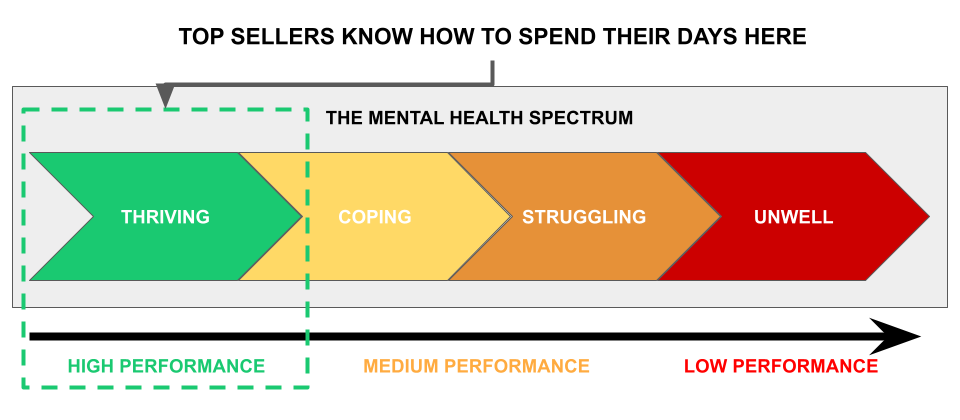If you’re a sales leader or individual contributor – you can’t rely on HR to be responsible for your Mental Health. This article will teach you about the Mental Health spectrum and why YOU need to be an active participant.
The Mental Health Spectrum
Mental Health is defined as a spectrum of well-being, that we fluctuate along in response to changes in our internal environment (thoughts, feelings, emotions, etc.) and as well as changes to our external environment (people we interact with, workplace, home, etc.).

Similar to the Physical Health Spectrum where people can be fit, healthy, overweight, obese, etc; every single person reading this article is functioning at some point on the Mental Health Spectrum.
Common words to describe where you fall on this Mental Health spectrum are: flourishing, healthy, coping, languishing, struggling or unwell/ dealing with a Mental Illness.
Mental Illness includes terms like anxiety, depression, burnout, eating disorders, addiction etc; and used when the frequency, duration and intensity of declining Mental Health symptoms are all very high.
We run into challenges when we mistakenly interpret “Mental Health” as only applying to “Mental Illness”.
It would be equivalent to interpreting “Physical Health” as only applying to various “Physical Illnesses” like high blood pressure, diabetes, or broken bones. As a result, we often put our Mental Health on the back burner. We wait to support the Mental Health of ourselves and only tend to it when we’re already struggling, hurt or very unwell.
This means days, weeks, months or even years of underperformance leading up to this point.
As our Mental Health starts to suffer due to various stressors and we move down the spectrum…
Healthy → Coping → Struggling → Unwell
Our daily sales performance is being impacted.
Recent data is showing that 63% of salespeople (over 60% for SDRs, Account Managers, Account Executives and Front Line Managers) are falling into the “Struggling” or “Unwell” categories.
So check in with yourself…
How is your Mental Health doing today?
What Can Sales Teams Do?
To the Sales Leaders reading this, you need to remember that sales is a marathon and not a sprint. As a result, you need to play an active role in leading the Mental Health discussion with your team.
This means providing Mental Health and Resilience training that will help destigmatize this conversation and limit the impact external stressors (rejection, deals falling through, etc) have on performance.
We can only achieve peak performance when we can keep our sales teams mentally healthy. Therefore we want to limit how much fluctuation happens along this Mental Health Spectrum on a daily basis.
For weekly best practices and strategies to support better Mental Health within sales – join the free newsletter below.
About The Author

Jeff Riseley is currently the Founder of the Sales Health Alliance and Mental Health Advocate. With over a decade of sales experience – Jeff understands the importance of Mental Health in achieving peak sales performance.
Jeff combines his sales and Mental Health expertise to improve sales performance through mental health best practices. His strategies have helped sales teams become more motivated, resilient and better equipped to tackle stressful events within sales.





4 Comments
Pingback: Why Are You Angry In Sales? - Sales Health Alliance
Pingback: Mental Health in Sales
Pingback: How to Respond to "I Feel Like A Failure" - Sales Health Alliance
Pingback: Are Sales Targets "Actually" Achievable? - Sales Health Alliance